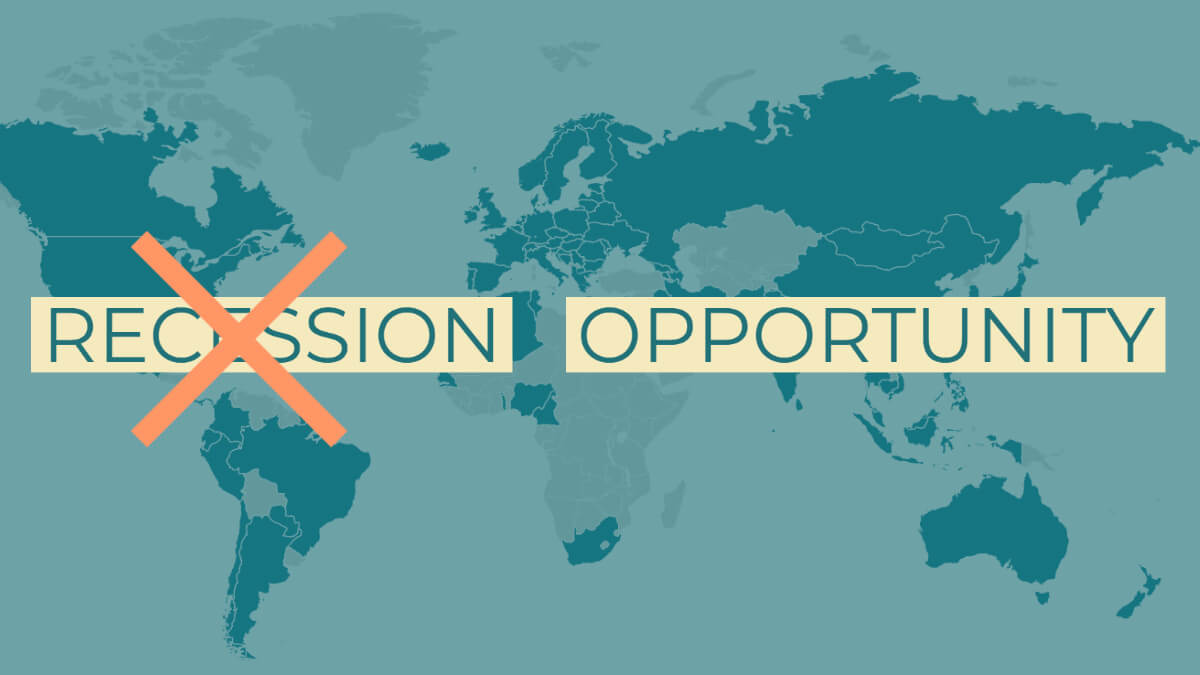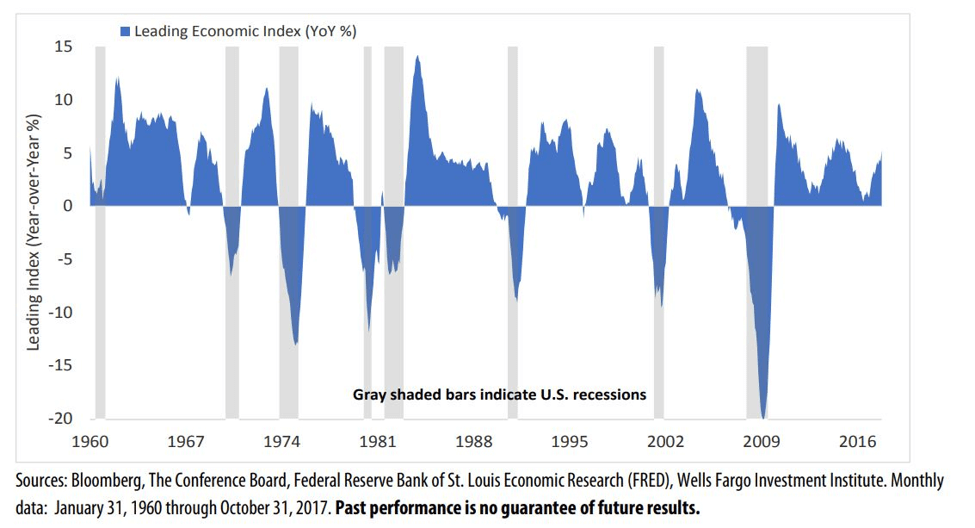No two economic downturns are alike. The Great Depression was caused by the crash of the 1929 stock market. OPEC’s oil embargo resulted in the 1970s recession. The Great Recession of 2008 came about from the subprime mortgage crisis. The 2020 recession was caused by the Coronavirus pandemic. And now in 2022, we’re seeing some of that fallout.
To say the least, the causes and consequences of each downturn can differ significantly.
But they all share similar patterns and behaviors. Which means we can learn from past recessions to overcome current downturns and prepare better for future ones. Not only that, but it is also possible to grow and grow big during (and especially after) a recession.
No matter when or why a recession occurs, there are ways to keep revenue flowing to dominate a downturn.
Keeping revenue flowing is one thing. Growing and gaining market share during an economic downturn is another. Because eventually, every recession will end, and the economy will rebound. Those who took the offensive before and during will come out the other side big winners.
Winners vs. Losers: Who Gains Market Share During a Recession?
During the Great Recession of 2008, we not only saw a clear delineation of winners and losers but in the ensuing expansion that followed those same winners continued to widen the profit gap. That’s because their ability to gain market share during a recession springboarded them to grow even more prominent during better times.

Some of these big winners included:
- Netflix – Thanks to its “digital distribution service” Netflix grew revenue by over $4 billion from 2008 to 2009 and became one of the largest streaming services in the world.
- Starbucks – Went from a 28% drop in profits at the start of 2008 to the world’s largest coffee retailer with a 40% market share by pivoting from expansion to building personalized customer relationships and embracing newer technologies like mobile apps.
- Apple – In June 2007, Apple launched something called an “iPhone.” A few months later, the recession hit, yet they set a revenue record at the end of 2008 during a time when everyone was spending less.
- Dominos – At the height of the Great Recession, Dominos announced it was increasing spending by millions on research and marketing over its new pizza recipe. During that time, it also became one of the first companies to take online orders. After the recession, Domino’s stock rose by 5,000%.
By looking for new opportunities and providing services that address customer concerns, these companies were able to thrive in the downturn. Granted, they were established companies with more brand recognition and a larger spend cap than most (both of which can go a long way during a recession), but back then, they certainly weren’t the blue chips they are today.
They owe much of that success to their forward-thinking recession strategies.
Even more impressive, and encouraging, are the early-stage businesses and startups that launched smack dab in the middle of the recession, yet came out big winners. These include:
- Groupon (founded 2008)
- WhatsApp (founded 2009)
- Venmo (founded 2009)
- Uber (founded 2009)
- Snapchat (founded 2011)

Unlike the previous list, these businesses couldn’t rely on brand familiarity or big budgets to succeed. Instead, they took advantage of cost-effective solutions and targeting recession-proof audiences.
For example, many of these early-stage recession winners banked on millennials. During 2008 this demographic was least impacted by the economic downturn.
In examining disparities between winners and losers after recessions, those who came out on top outperformed their peers in early cost restructuring, balance sheet discipline, aggressive commercial growth strategies, and proactive mergers and acquisitions before and during the recession. As a result, the downtown completely rearranged the market, citing:
The number of US companies that substantially increased profits was 47% higher during the last downturn than during stable periods. And 89% more US companies lost profitability in the last downturn vs. stable periods. No question, recessions can swing the future market capitalization of a company by billions of dollars.
In other words, those who did not find ways to increase revenue through innovation and branding pivots during a recession compared to their competitors severely lost market share when things got better.
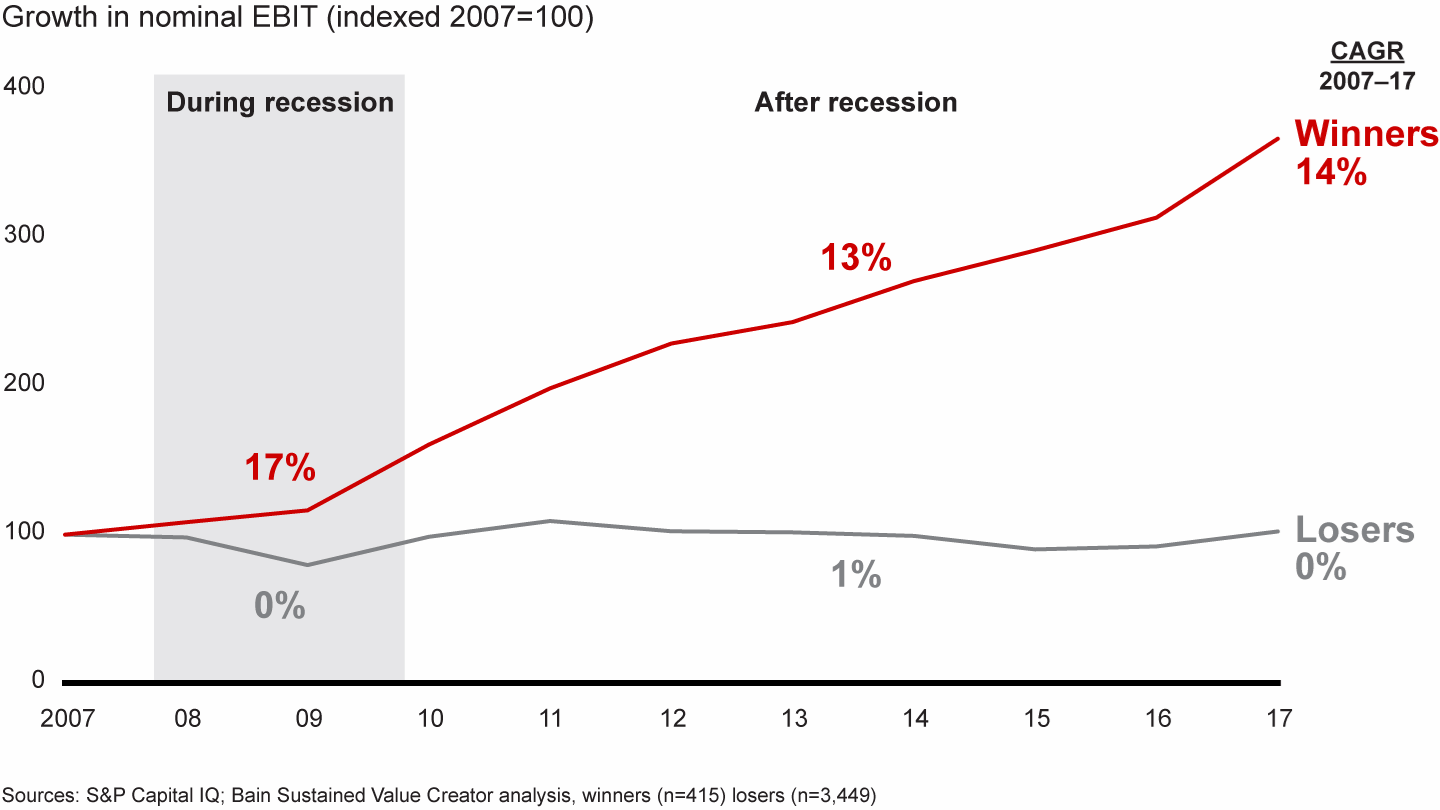
The takeaway?
No matter what budget your business is operating with or the industry you are operating in, companies that succeed during a downturn do so using a specific set of similar creative tactics.
Tactics that you can take advantage of to ensure you capture market share during an economic crisis.
5 Tactics to Help You Gain Market Share During a Downturn
1. Identify How Your Customers React to Economic Crises
Sophisticated marketers segment their audience according to demographics, technographics, sociographics, and firmographics. However, in an economic crisis, consumer behavior should, in many cases, be leveraged to drive your decisions.
A good marketing strategy during a recession is to identify which of the following your audience fall into:
- The Hardest Hit – The most affected financially by an economic downturn. In response, they reduce spending across the board. They are typically low-income consumers and unemployed, but can include any level.
- The Planners – The largest segment, economizing to maintain their current standard of living but concerned that things could take a turn for the worst at any moment. In response, they reduce spending, but less so than the hardest hit. As the crisis prolongs, many will turn into the hardest hit.
- The Well-Off – This group feels secure about their ability to ride out the crisis. They make few changes in their spending habits other than being a little more selective. They typically include higher-income consumers, avid investors, and cash-positive businesses.
- The Unphased – This group is unconcerned and acts as if immune to the impacts of the crisis. It’s business as usual for them as far as their spending habits are concerned. They typically consist of younger audiences.
Another good strategy during a recession is to use generational shifts as an indicator. For instance, while Millennials were the least impacted during the 2008 recession, they were the most negatively affected by the 2020 Coronavirus recession, supplanted by Gen Zer’s (born between 1995-2010) as The Unphased.
Shifting your targets during a recession could help keep revenue flowing. or help you tap into a new market entirely.
2. Identify What Your Consumers Buy During an Economic Crisis
In studying how to market in a downturn, experts John Quelch and Katherine Jocz posited that there are four categories of products and services during an economic crisis.
- Essentials – Items necessary for survival or perceived vital to well-being (like food, shelter, clothing, healthcare, transportation, and of course, toilet paper).
- Treats – Indulgences whose purchase is considered justifiable (like iced matcha lattes).
- Postponables – Items whose purchase can be put off (like new cars or home improvements).
- Expendables – Items that are perceived as unnecessary or unjustifiable (like dog overalls).
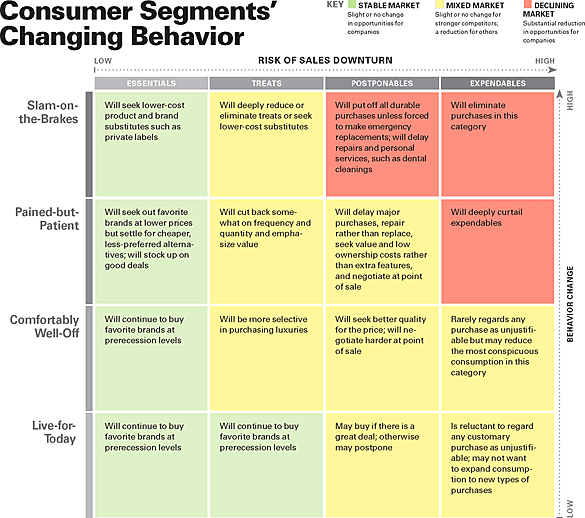
What products and services comprise each category are characteristic to each consumer. So once you identify how your consumers react to a crisis, you will want to identify what items they consider as relevant to each product category.
For B2B, you’ll want to consider the buying habits of your customers’ customers.
3. Reallocate Funds to Recession Resilient Strategies
Stabilization, not stifling, is the best way to endure during a recession. In past downturns, many companies that increased advertising spend captured market share from more conservative rivals. They did so at a lower cost than typical and were rewarded by continued growth following the recession’s end.
But understandably, it can be hard to justify increasing budgets in times of uncertainty. So an effective, less risky strategy during a downturn is to find that “extra cash” in other, less vital business operations.
4. Innovate and Pivot into New Mediums
During a recession, the best way to grow is to adapt. Likely, the needs of your customers will have shifted during a recession, and you will need to follow suit.
Spot new trends before your competitors do. (Using Google Trends to monitor search behavior is a great place to start.) Once you understand where your customers are and how your industry is evolving, innovate your offering to capitalize. Likely, this will involve pivoting your distribution methods, service features, marketing channels, and or brand messaging.
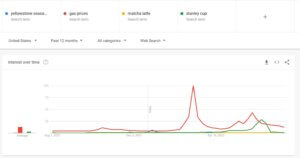
In 2008, Starbucks was an early adopter of a personalized mobile app with a rewards program, while Dominos was one of the first to use the Internet to order food. In 2020, Zoom went from being a business conferencing platform to connecting grandparents with their grandkids.
How you innovate will be different for every business, but one thing is certain: you must innovate. Then find the best ways to market that innovation and reallocate any stagnate budgets to bolster its effectiveness.
For instance, during the Coronavirus outbreak and 2020 recession, video played a key role in business success. As did digital marketing, in particular, SEO and paid media, in response to the influx of homebound consumers going online. Businesses that did not have an online presence of some kind lost market share to more digital-savvy competitors.
So the process becomes:
- Find new opportunities to provide value to customers
- Make data-driven decisions on which to choose
- Innovate new offerings accordingly
- Rely on cost-effective marketing channels to spread awareness
5. Position Yourself for Recovery by Building Trust as Well as Revenue
Generating revenue during a recession is about keeping your business stable and secure against economic uncertainty. Capturing market share during a recession, on the other hand, is about positioning your business to dominate when things return to normal.
So make sure you’re not just reacting to current conditions, but planning for the recovery as well. For instance, during the COVID-19 outbreak, companies have had to walk a tightrope between selling and insensitivity. This sometimes means pulling back direct selling and replacing it with helpful, recession-sensitive marketing that still benefits your brand.
Brand trust campaigns might not result in an immediate sale, but they still position brands to capture market share during the inevitable recovery.
Avoid Making These Mistakes During a Downturn
Just as important as taking advantage of tactics to ensure you capture market share during an economic crisis are avoiding ones that cause you to lose it.
Typically the losing companies fall prey to several different recession pitfalls. Such as:
- Extreme cost-cutting to ride out the downturn
- Letting unused funds sit stagnant instead of reallocating
- Halting research and development, and product development
- Reducing marketing and ad spend
- Pursuing trends too far outside their core business
- Being reactive instead of proactive to economic changes
Avoid making these recession mistakes. Those who don’t may end up falling behind, and by the time they realize, it will be too late to recover. Those who follow the 5 winning tactics above will be in a great spot to capture market share and grow, even during an economic crisis.
Currently, we are offering a complimentary analysis for brands that are looking to expand market share. Our opportunity analysis will include market insights and competitor insights so you can see how your competitors are faring. Fill out the short form and we’ll be in touch!







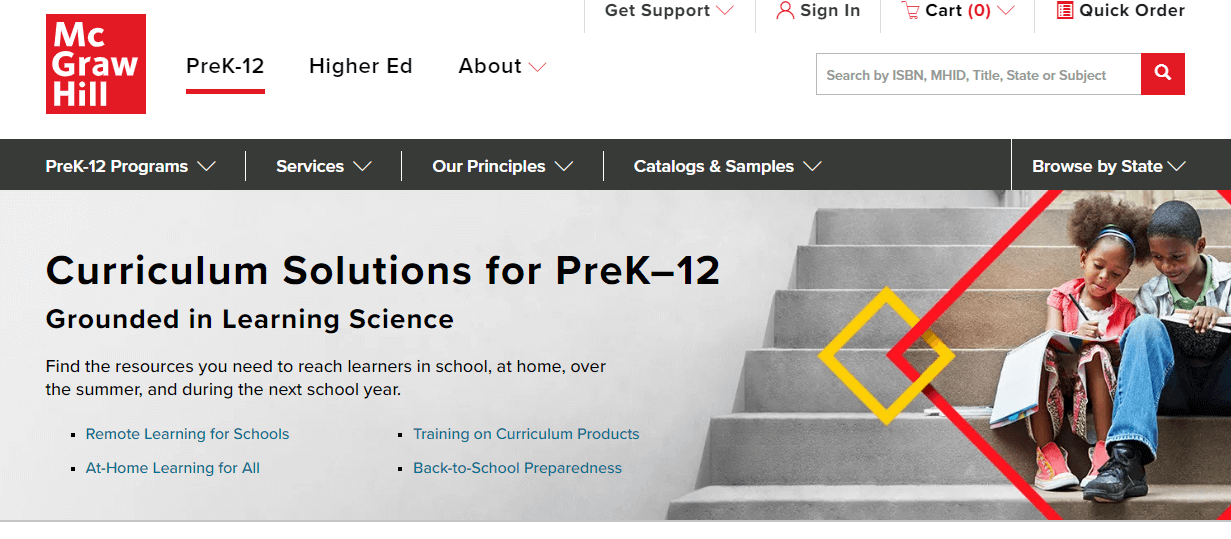 During the 80s,
During the 80s, 


